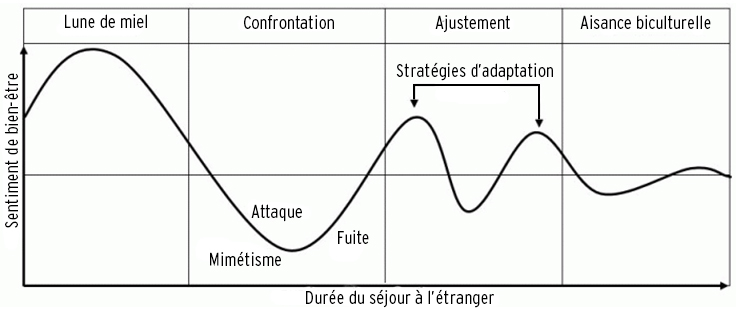Culture shock
Part 1: Culture shock
What happens during immigration? On the one hand, the experience of the person moving, with his or her expectations, cultural baggage, way of thinking and doing; on the other, the experience of the person receiving, with his or her language and value system. And the interaction, between the two, of two beings and two cultures. All in all, a shock, gentle or brutal, absorbed or shattered.
Culture shock can be defined asan experience of stress and disorientation for the person learning to live in a new culture" (Kalervo Oberg).
When exposed to a new culture, as is the case in expatriation, the change of environment leads to a more or less complete loss of reference points for the individual. Understanding the cues and implicit rules that govern a society can be time-consuming, and a source of anxiety and stress.
We feel it when new values and beliefs clash with, or even oppose, those of our country of origin. And this is also felt in everyday life: how to say hello, how to thank each other, when to offer or accept an invitation, should I shake hands? Should I leave a tip? Should I compliment him on his outfit? Every social interaction becomes a meeting ground between our native culture and that of the host country.
Culture shock can be divided into four main stages, shown in the image above:
- 1) The honeymoon
This first stage can last from a few days to a few weeks, and begins before the actual arrival. It's a phase of euphoria and excitement, combining expectations about the stay, the discovery of the new country and the excitement of new experiences.
- 2) Confrontation
Once the honeymoon is over, the daily routine settles in, and it's time for a "crisis". From tourist to resident. Cultural differences disorientate you, and you miss the country you left behind. Your host country seems less attractive and doesn't always live up to your expectations: this is when you experience your first disillusionment. In this phase, you may be affected to a greater or lesser degree by various depressive symptoms such as frustration, helplessness, isolation, nostalgia and homesickness, boredom, loss of appetite, irritability, stress, hostility towards the host country and its inhabitants, fatigue.
- 3) Adjustment
As your stay continues, you gradually integrate into your new country. You build social relationships, and begin to accept and understand the social norms and values of this new culture. You assimilate what suits you and put aside what does not. The shock begins to be absorbed, and balance is restored.
- 4) Bicultural ease
The final stage can take months or even years. It's when you feel as comfortable in your home culture as you do in your host culture. Is there really any difference between the two? You are now at home.
And what do you do when you can't get past phase 2? When integration seems impossible and only a return to the country of origin is an option? We'll look at this in the second part of this article.
Do you recognize yourself in these stages? Have you been through them?
Bibliography
- From culture shock to integration, Sonja Susnjar. Article taken from Bulletin Vies-à-vies, vol. 4, no.5, April 1992, Université de Montréal.
- Laval University. Direction des services aux étudiants. "Culture shock and adaptation", URL : https://www.bve.ulaval.ca/etudiants-etrangers/vivre-a-quebec/choc-culturel-et-adaptation/,



